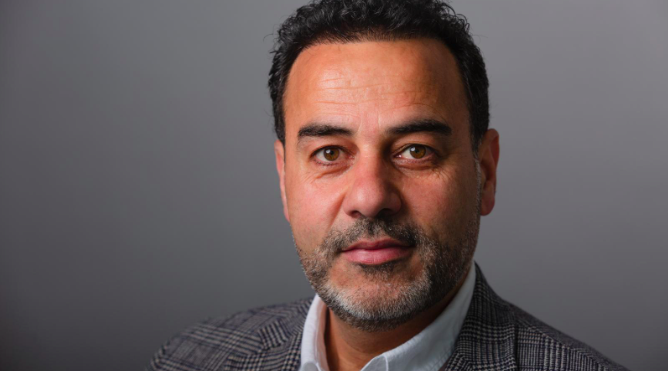Wael Odeh on Identity

By Lulu Goad, BA Arabic
A Senior Lecturer of Arabic at SOAS, University of London, Wael Odeh has been part of the university cohort for almost ten years having studied his Master’s in Applied Linguistics just next door, at Birkbeck, in 2013.
Mr Odeh spoke to me earlier this year about Syria and identity, recalling some of his earliest memories to relay to me for this article. Within the two hours that we spoke, it seemed Wael hadn’t spared a detail, nor had he missed any opportunity to rehearse a line of poetry. “I don’t take things too seriously,” he said, “because life is not only about chemistry and physics and one plus one equals two… life is much more than that.” Despite his romantic attitude towards life, Wael expresses his somewhat endless struggle with identity and belonging, shaped by both his life in Syria and in the UK.
Wael was born in a village in the countryside of Homs in 1978. “If you’re going from Damascus to Aleppo,” he said, “Homs is almost exactly in the middle.” He lived there with his parents and nine siblings where his parents worked the farmland, growing crops to earn a living. Wael was the only child in his community to attend school after the age of 15, and upon his graduation, he promptly moved to Damascus to begin his Bachelor’s degree in Journalism.
“In Syria, identity was very easy when I was there. You’re made to feel locked into an identity. People were always confused because I don’t look or sound like I belong to a specific group. I hated that but those were the dynamics in Syria.”
Moving to Damascus from his home in Homs was the first opportunity Wael had had to interact with individuals from all over the country. Living with some of his newfound friends in the city, Wael found himself forming a new sense of identity, “a wider identity of being Syrian,” he said; “it corrected a lot of stereotypes,” which by the tone of his voice was for the better. But he emphasises that he felt stuck, as did many if not all of his peers. “We wanted some more,” he paused, “..freedom. Freedom to think, to express, to say what you feel, to experience, to have opportunity.”
This was the late 1990s and early 2000s. Syria saw the transfer of power from Hafez al-Assad, infamous for his imposition of mass surveillance, to his son, Bashar al-Assad, who now governs Syria as a totalitarian state. “The political atmosphere at that time was like it is now – very sensitive – so you would only be able to express yourself intimately with your best friends.” Dipping back into his early life, Wael is sure his access to education has granted him some of this “freedom.” His parents had never gone to school but they were always insistent that as many of their children were educated as possible. “They always wanted us to learn and I remember my dad saying ‘This is your only way to get out of this, by learning, by educating yourself.’ I did very well at school.”
Having graduated from Damascus University, Wael completed his military service before being offered a job at the Syrian Opera House, followed by a role teaching Arabic at The French Institute of the Near East (IFPO). When asked how he began his work at IFPO he simply said, “because of poetry.” It wasn’t clear whether this was his tongue-in-cheek humour but as he went on to explain, he had in fact won over the Head of the French Institute with his astute knowledge of a poem by the mystical poet Ibn al-Farid.
“I don’t like poetry now,” he added, somewhat solemnly, “I don’t know, I became more realistic maybe.” “I met my wife through poetry as well, I mean poetry did its job for me.”
Wael goes on to talk about his first trip to Europe taken with his friend, the Head of the French Institute. “So I came to France. Until that point, I had always wanted to be a foreigner, because, when I saw how foreigners were treated in my country… Everybody offers them help and there’s this kind of white privilege, you know? Superior, cool, exotic… So I wanted to experience that.” Living in Syria, “locked” into an identity, Wael was sure of his sense of self. “I didn’t have any questions about who I was because until then I knew who I was.” He continued, “..so when I came to the West, I mean I didn’t feel like a ‘foreigner’. Nobody cares. I mean I could walk around naked here, nobody would give a damn in that positive sense.”
“I had a family but I had no job and no friends…I didn’t have a fixed plan but I never imagined that I wouldn’t be able to go back to Syria, because Syria was my home.”
Having been offered a job at SOAS, Wael moved to the UK with his wife, but due to complications acquiring his visa, he was unable to take up the position. “I had a family but I had no job and no friends…I didn’t have a fixed plan but I never imagined that I wouldn’t be able to go back to Syria, because Syria was my home.”
“I got a job in a bank – this was in 2009 – and then my life started to become like a “London life”, the nine to five, the thing that I’d never hoped for,” he continued, “but then I read another verse of poetry. That was the last time poetry changed my life.” Pausing momentarily to recall the words, he then recited a line of ‘Leisure’ by William Henry Davies: ‘What is this life if, full of care, we have no time to stand and stare.’ “I quit my job immediately.”
Wael then took up his master’s degree at Birkbeck. A few hours before submitting his dissertation after a year of Applied Linguistics, Wael received a job offer to work as an Arabic Lecturer at SOAS. “It was my happiest day ever.”
“But just when my life had become stable, the war started.” Despite the obvious disruption and upset caused, he expresses that there was a huge underlying positive shift. “The Syrian spirit had returned! I finally don’t need to explain to people where Syria is. Finally, I’m recognised, recognised as a Syrian! And I was so hopeful that they were going to achieve that dream that I’d had with my friends at university, of freedom, of loving each other without any fear or suspicion.”
“Then all of a sudden everything was upside down. My family was displaced and I lost so many of my relatives. People were very desperate, yet there was still hope. Then, what happened happened… It’s like a completely foreign country… I struggle to picture me and my family living there.” He says that his disassociation with Homs feels like his, “roots have been cut.” He compares the sensation to grieving one’s own mother.
Many of his family members have since fled the country to Libya, Lebanon and Germany, to name a few. One brother in particular ended up in the northwest of Germany. “I started to visit my brother and his family in Germany, which became, eventually, my alternative home, my safe place, full of Syrians.”
As it became more difficult for Wael and his family to travel back to Syria, he found himself subject to questioning by his son and daughter about who they were, where their extended family was and why they never saw them. “In the holidays we go to Germany. I realised for my kids the concept of being Syrian, and from a small village, when they try to picture it, they think of that village in Germany… My son speaks fluent German now.”
He explains how despite the war ending, the issue of identity became the new normal for Syrians. “I cannot be fully Syrian or fully British… and I always have to explain to my kids why we don’t go to Syria.. And then if I don’t go to Syria, what should I do? Go and enjoy my life in the south of Spain with my kids on the beach like British people do?”
“In Arabic, we say ‘راحت السكرة’ – this is the new reality now.”

